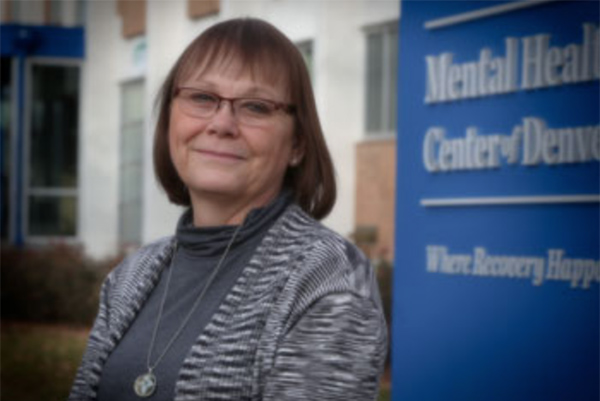Kristi Mock, Vice President of Adult Recovery Services
Setting Higher Standards for Care
Colorado native Kristi Mock began her career as a student intern at Bethesda Mental Health Center. She later joined Park East Mental Health Center as a social work therapist. In 1989 Bethesda, Park East and two other Denver mental health centers consolidated into the WellPower. Today, as Vice President of Adult Recovery Services, she oversees the organization’s residential facilities, adult services and the Access Center. She played a significant role in planning and developing the Recovery Center, which opened in 2012. Most recently, she organized the startup of Denver’s new Walk-In Crisis Center, part of a recently created statewide network of services that provide immediate help to people in need.
In college, I thought I would get a Ph.D. and become a school psychologist. In my senior year, I did an internship at a community mental health center and state hospital on Maryland’s eastern shore and I absolutely loved what I did. I finished my psychology degree and decided to get a master’s degree in social work. When I started working in the 1980s, community mental health centers were fairly well established. The four serving Denver were quite distinct, and lacked collective power. They had catchment areas, meaning that they served consumers based on geographic boundaries. When consumers moved, as many did, their care would transfer to a different center, making it more difficult to receive excellent and continuous treatment. All four centers replicated services, so they weren’t robust in meeting diverse needs, and they had limited availability. The four centers replicated services with limited availability and were not meeting diverse needs.
Becoming one mental health center, serving all of Denver, was really challenging and a really good thing to do. Instead of four separate sets of programs, we were able to have one strong program. I firmly believe that the changes we made along the way have taken us in a better direction.
I am very proud of the changes and improvements that came about in the availability and quality of services in the 1990s. At the time, some people believed that our new, intensive services were of the “Cadillac” variety. In fact, though, we created a new standard of treatment that was appropriate to meet the needs of the people we served. Today we no longer believe our job is just about keeping people out of the hospital, it’s about helping people recover from mental illness and homelessness, and to experience a sense of well-being. This new standard is helping people live the rich and meaningful lives they want—being part of the community where they live, having connections to friends and family members, access to jobs and education, safe and affordable places to live.
I’ve been richly rewarded by being part of the work we’ve done over the years… to support and foster healthy, happy lives and to see the life changes that occur in the people we serve. It is inspiring to see people not just surviving, but flourishing.


